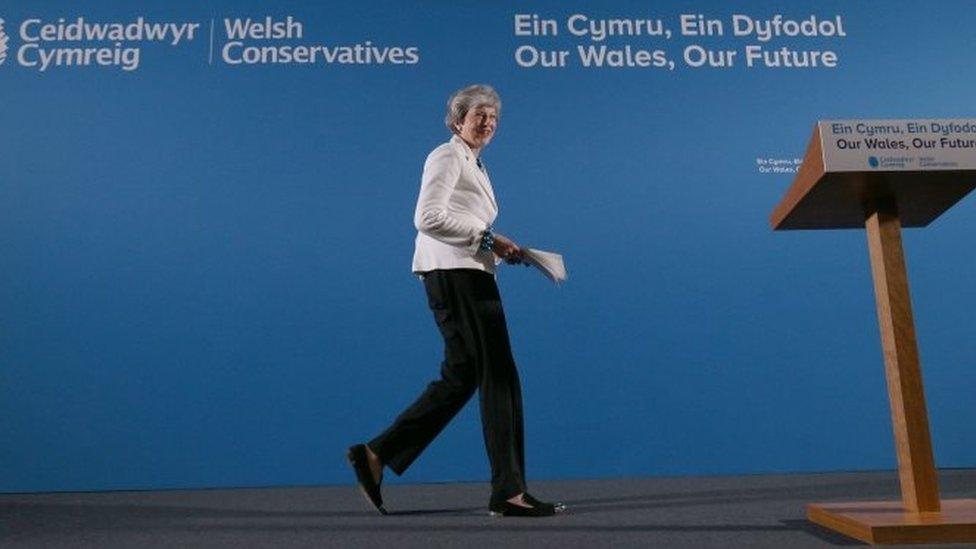Local elections: A bitter flavour for Labour and Tories
- Published

Theresa May was heckled at the Welsh Conservative conference
Neither the prime minister nor the Labour leader has anywhere to hide.
After nine years in government it's not surprising that the Conservatives have lost a significant chunk of seats.
But the sheer number that have disappeared and the loss of control of authorities will hurt - especially with so many activists identifying Theresa May's handling of Brexit as a root of the problem, not just a general malaise.
The perceived personal nature of the failure is more of an indignity than an encounter with a heckler in tweeds.
And for Jeremy Corbyn, it IS surprising and disappointing that Labour has simply failed to make any significant capital from such a divided and chaotic government.
However ardently his devotees swear loyalty, the party has fallen back - on this set of results at least - seeming further rather than closer from winning power in a general election he so often claims to crave.
Take a breath. Local ballots do not translate directly into the next general election. It bears repeating time and again that specific rows over green belt building, local party spats, even simple quirks of geography all apply too.
But such an enormous set of results does give a sense of the public's political taste at this moment. And it provides a bitter flavour for the two big UK parties - locked in an uncomfortable embrace with historically feeble levels of support.
Jeremy Corbyn's Labour failed to improve on 2015's results
The public will also have given both of them anxiety about the potential of the Lib Dems to creep back into their territory after a strong show. And the sour mood around Brexit adds more pressure to Labour and the Tories in their own ranks too.
For Mrs May it directly and overtly gives ammunition for convinced Tory Eurosceptics to demand a more rapid departure from the EU, whatever happens.
The delay, they believe has been toxic, so the solution is to speed on. And for Labour's many supporters of a second referendum, the significant advance of the Lib Dems and the Greens is evidence that a clear demand for another say is the only way to carve out a convincing identity.
That geographical pattern is very marked, although unwise maybe to assume it can last, or a howl for another referendum is what it overwhelmingly means.
Grisly pantomime
Because while our departure from the EU has just shaped yet another chapter of our politics in an unconventional way, two of the old rules do still apply.
After months of grisly pantomime, the rejection of both parties may well also be a simple judgement on both main parties' competence.
Voters quite plainly like politicians who look like they know what they are doing. And the public does not like parties that spend vast amounts of time fighting amongst themselves.
Whether government or opposition, we want them to care about us, rather than be expected to care about them.
No surprise for today at least, that the Labour and Tory leaderships are both outwardly trying to push harder for a joint deal that could find a way out for them both - damned or saved together.
But their local election anguish doesn't make a deal any easier to achieve.
So our two big political parties are both finding there's been a cost to conflict and messy internal compromise.
And will look ahead nervously to the European elections when two new parties created specifically to advance clear ways out of the Brexit stalemate could divide the public more cleanly, and mete out a much more painful punishment to them.